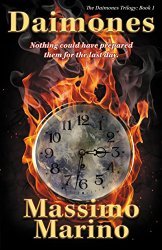The Self-Published Writer’s Hubris
 I understand… Sometimes we should just raise shoulders, and move on. But sometimes it is just a tough one.
I understand… Sometimes we should just raise shoulders, and move on. But sometimes it is just a tough one.
One aspect of self-publishing that really ruffles me up—and it does so because it hurts all independent authors—is the oddball writer who has quite a peculiar vision of what entails publishing, being read, and the care and sweat needed to achieve that.
The tirade is about understanding self-publishing as a Do-It-Yourself business. Wrong!
The reasons and motivations behind that reasoning(?) can be varied, but the result is always the same:
“I don’t need anyone, I’m good as I am, nobody will ever make me any better than I’m already.”
The self-published writer’s hubris.
I just had a sort of querelle with someone who, although he claims that it is only a personal thing and he doesn’t suggest others to do the same, invariably writes down a comment on any and every thread online I’ve seen that has to do with editors, proofreaders, and the work they do with writers.
He goes on describing how he doesn’t need nor want the help of editors and proofreaders because one can self-study to do it properly and he’s there to prove it. The absurdity goes even further with comments (citing) like: “I don’t want them” [i.e, readers] “thinking my writing is good because it has been improved by someone else. I strive to produce my best output. A professional editor, proofreader or beta reader cannot improve my best, they can only change it or add to it, or even make the writing better. Thereafter it ceases to be my best, but theirs.”
There are many flaws with that position, clearly affected by the self-publishing hubris:
1) The assumption that your writing is so good that you don’t want readers think that it “… is good because it has been improved by someone else.”
All right, dude. Calm down. You’re in cloud nine and with the highest levels of hubris’ fever.
2) “A professional editor, proofreader or beta reader cannot improve my best.”
Right, your work is the next Greatest American Novel and the level of your writing is already up there, at the writing’s zenith.
3) “they can only change it or add to it”
Wrong, an editor (depending on which level of editing) will fix the obvious typo, or grammar issue, but will not “change” or “add” anything. He’s not there to change your voice, she will point at so-so areas to make *you* the writer think harder: did you really wanted to say *this* this *way* ?
Ah, yes. You don’t have so-so areas.
4) “A professional editor, […] cannot […] make the writing better.”
Yes, we got it, you’re in Mount Olympus with the greatest writers of all times.
5) “Thereafter it ceases to be my best, but theirs.”
Dude, you never worked with a real editor, and you really have a ‘grandeur’ syndrome.
Thanks for reaching the end of this post, and if you are an independent writer, when you’ve spent countless hours on self-editing and self-proofreading, acted upon the feedback from your beta readers, let that 4th version of your manuscript rest for weeks until you almost forgot about it, and then read it aloud once more, do your fellow writers and your readers a huge favor, HIRE AN EDITOR.
Added on Sunday 9th of August: This is another REAL example of self-delusional publishing, I’m sure you’ll recognize the sign of hubris this writer shows:
“Your, not going to believe, what happened to me?
I have been trying, to get, this book published and like a different person, was black listed, before I even got a chance, to prove myself. I have been ever since trying to improve my book and thereby, my vision got lost and also, I tried to bring in old English, to make the ways, that I wrote, more interesting and more educated, like in the older parts, of our livingnessess, something similar, to this language and the publisher, would not even, edit my book.
I have been, struggling since and now, I had a friend read the prerequisites, in front of me and I realized, that by mistake, I wrote a book, that maybe, Einstein could read, so I am dumbing it down and I am so lost and so not knowing, where to go, with these problems.
Please, realize that this is the third edition, of this same book. The first time, the book was perfect, the second time, I was insecure already and the third, I put too much intelligence and too much knowledge, of the quantum particles of energy and how it effects us, instead of just, separating each subject, into smaller segments and an easier constitution, so that these smaller parcels, of informations, would be easier to grasp and to be, understood and absorbed, in a better fashion.”
Let’s analyze the above (forget the many grammar mistakes, the horrible punctuation, and the style—for a moment, if you can, that is). If you read the first lines, the hubris is obvious, the writer doesn’t take the time to think that maybe the fault it’s all his:
“Your, not going to believe, what happened to me? I have been trying, to get, this book published and like a different person, was black listed, before I even got a chance, to prove myself.”
Apart from the grammar and punctuation, so it’s because the others have been mean to the writer in an unbelievable way. Singled out, even.
Again, the writer insists in putting the blame on others: “I tried to bring in old English, to make the ways, that I wrote, more interesting and more educated, like in the older parts, of our livingnessess, something similar, to this language and the publisher, would not even, edit my book.”
I see lots of hubris between the lines in the above piece: “I wrote a book, that maybe, Einstein could read, so I am dumbing it down.” – “The first time, the book was perfect” – “I put too much intelligence and too much knowledge, of the quantum particles of energy and how it effects us”
Besides, I’m a particle physicist and the last sentence alone makes me cringe; I can’t but see another self-delusional, full of hubris writer.
It is fine for a writer to decide that self-editing and self-proofreading is all s/he will do before publishing—there might be serious reasons to limit oneself that way. It is self-delusional to think that this is how s/he has achieved the best possible results for the story. And THAT is a disservice to readers who deserve much more than a self-edited and self-proofread book, but—again—there might be serious reasons behind the decision to limit one’s potential.
Making anything well involves a commitment to the work. And that requires courage: you have to trust yourself to the point of seeking the opinion of beta readers qualified to judge, or a trusted peer-group, and then your companion, the editor. Other eyes can see what you’re too close to your work to see, give perspective, open up possibilities.
It helps to remember that the goal is not to write a masterpiece or a best-seller. The goal is to be able to look at your story and say, “Yes. That’s as good as I can make it.” It is not achieved just by yourself and your own judgement.
“Writing and editing aren’t as similar as you’d think, the skills are very different. Besides, you should never self-edit*. […]. It’s two different personalities and most often needs two different people. Get help, professional help. It’s your career and your dreams at stake, nothing less than perfect will do.” — from 4 Assumptions that Help Authors Fail
If you’re a reader, appreciate what good there is, but don’t be shy if what you read falls short, say the writer: Dude, get an editor. Your story deserves it much more than you think.
* if you read the referred article, the “you should never self-edit” refers to believing that with self-editing we—as authors—can do without editors.
Massimo Marino is a scientist envisioning science fiction. He spent years at CERN and The Lawrence Berkeley Lab followed by lead positions with Apple, Inc. and the World Economic Forum. He is also co-founder of “Squares on Blue”, a Big Data Analytics service company, and of BookGarage, a publishing service brokerage company.
Massimo currently lives in France and crosses the border with Switzerland multiple times daily, although he is no smuggler. #SFWApro
As a scientist writing science fiction, he went from smashing particles at accelerators at SLAC and CERN to smashing words on a computer screen. He is is now an author with Booktrope Publishing, LCC, and Active Member of SFWA – Science Fiction & Fantasy Writers of America.
smashing particles at accelerators at SLAC and CERN to smashing words on a computer screen. He is is now an author with Booktrope Publishing, LCC, and Active Member of SFWA – Science Fiction & Fantasy Writers of America.
He’s the author of multi-awarded Daimones Trilogy. The 1st volume, Daimones (The Daimones Trilogy Book 1) , published by Booktrope is available since August 2015.
, published by Booktrope is available since August 2015. 
 His novels have received the Seal of Excellency from both AwesomeIndies.net and IndiePENdents.org
His novels have received the Seal of Excellency from both AwesomeIndies.net and IndiePENdents.org
• 2012 PRG Reviewer’s Choice Award Winner in Science Fiction
• 2013 Hall of Fame – Best in Science Fiction, Quality Reads UK Book Club
• 2013 PRG Reviewer’s Choice Award Winner in Science Fiction Series
• 2014 Finalist – Science Fiction – Indie Excellence Awards L.A.
• 2014 Award Winner – Science Fiction Honorable Mention – Readers’ Favorite Annual Awards
His novels are available from Amazon, Barnes & Noble (Nook), iTunes Apple Store, and many other retailers around the world.
Join his mailing list for new releases, or follow him on Facebook, Google+, and Twitter.
The post The Self-Published Writer’s Hubris appeared first on § A Scientist Envisioning Science Fiction.




